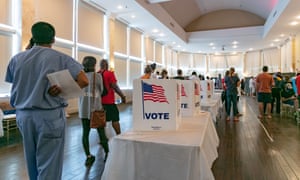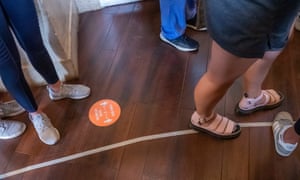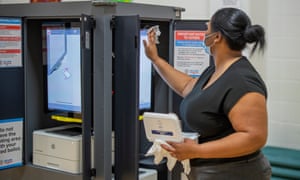The fight to vote
US elections 2020
‘We’re going to have a catastrophe’: US faces November election fiasco
The chaotic scenes in Georgia’s primary this week could be a foretaste as states fail to take urgent action to secure the vote

Photograph: MohammadJavad Jahangir/Rex/Shutterstock
The alarm bells have been going off for months, but the election fiasco in Georgia on Tuesday made it clear: America is ill-prepared to hold a fair presidential vote in November, and is dangerously close to having an election disaster.
The Georgia contest offered the most alarming preview to date of what could happen in November without major overhauls, training and planning. Voters stood in line to vote for upwards for four hours, saying they never received mail-in ballots requested weeks ago. Local officials, forced to consolidate polling locations because of Covid-19, were unable to manage the influx of voters and struggled to operate new voting equipment.
Experts worry that poll worker shortages, long lines and other delays in processing requests for absentee ballots will only get worse in November, when there will be more voters. Since March, voting advocates have been calling on states to prepare for an election like no other, and quickly implement plans that accommodate a surge in voters casting their ballots by mail for the first time as well as robust turnout at the polls.
One estimate places the cost of upgrading vote-by-mail systems across the country at $4bn.
“We’re just going to have a catastrophe in November,” said Michael McDonald, a professor at the University of Florida who studies elections. “We’ve already passed the point of catastrophic failure. It doesn’t get any better if we have two to three times the number of people who are trying to vote in these polling locations.”
Not every primary in the Covid-19 era has been a disaster, and there has been strong turnout in many states as Americans have embraced voting by mail at unprecedented levels. But Georgia was far from the only place where there have been serious election problems.
Voters in Nevada waited hours in line to vote in the state’s primary on Tuesday, even after the state moved to conduct its election largely by mail. Earlier this month, election officials in Pennsylvania and Washington DCstruggled to meet the crush of requests for absentee ballots and voters in the nation’s capital waited hours to vote. Voters in Baltimore, Maryland didn’t get ballots and faced long lines. In April, voters in Milwaukee, Wisconsin, waited hours to vote in the state’s primary as the city was forced to condense its usual 180 polling places into just five.
Most glaring, voting groups say, has been the disproportionate impact the election failures have had on communities of color. LaTosha Brown, a co-founder of Black Voters Matter, told Politico it took her three hours to vote in her majority African American precinct in Atlanta on Tuesday, but she saw no line at a polling place in a predominantly white area later in the day. State officials have launched an investigation into what went wrong in Fulton county, which includes Atlanta.
“Black voters in particular appear especially hard-hit,” said Kristen Clarke, president and executive director of the Lawyers’ Committee for Civil Rights Under Law, which has closely monitored the primaries. “In some parts of the country, it feels like officials are making reckless decisions that are a recipe for disaster.”

Even before Covid-19, there were concerns about mass disenfranchisement in November; the pandemic has only exacerbated them. Donald Trump is already making repeated baseless accusations of voter fraud in what appears to be an effort to lay the foundation for contesting the legitimacy of the 2020 election.
Activists were already deeply concerned about the mass closure of polling places and the Covid-19 pandemic has given election officials justification for doing so. More than 1,600 polling places in jurisdictions previously covered by the Voting Rights Act were closed between 2012 and 2018, according to a report by the Leadership Conference on Civil and Human Rights. That includes 214 polling places in Georgia.
Democrats and voting rights groups are also pushing states across the country to extend the deadline by which absentee ballots need to arrive to be counted. Many states require the ballots to arrive by election night, a cutoff that could leave eligible voters disenfranchised. In Wisconsin, Democrats secured a court order requiring the state to count ballots as long as they were postmarked before election day and arrived within six days of the election.
More than 79,000 ballots that normally would have been thrown out were counted during the extension (Trump won the state in 2016 by just under 23,000 votes).
There is also growing concern about plummeting voter registration in recent months and an unprecedented Republican effort to monitor the polls and challenge the eligibility of voters who appear, something that could result in voter intimidation. The Republican National Committee, freed from a decades-old court order prohibiting them from such activity, is seeking to recruit up to 50,000 volunteers.
The window for states to understand the problems from their primaries and implement solutions for November is rapidly closing. Recommended deadlines for purchasing necessary equipment and other measures are approaching and in some cases have already passed. Republicans in Congress have also scaled back funding to help states run elections, allocating just $400m so far, a small fraction of the billions experts say is needed. The Republican National Committee also plans to spend at least $20m to oppose efforts to expand vote by mail.
“If no one, legislators/advocates/voters/election officials, listens to what is being said it will be a debacle in November,” Tammy Patrick, who works on election administration at the Democracy Fund, said in an email. “The primaries have been the canary in the coalmine.”

Meanwhile, there have been some encouraging signs. After Wisconsin’s chaotic April primary, the state’s bipartisan election commission released a detailed analysis of what went wrong and unanimously voted to send an absentee ballot application to all voters who hadn’t requested one for November. The commission also moved to give local clerks – who were overwhelmed by ballot requests during the primary – more help. California announced in May it would send a ballot to all registered voters. Michigan – which saw extremely long lines at the polls during its March primary – is also sending an absentee ballot request to all voters.
But other signs suggest states may move in the opposite direction. In Georgia, Brad Raffensperger, the state’s top election official, refused to acknowledge systemic problems in the way the election was run this week, instead blaming local election officials. In Iowa, Republicans are considering legislation that would prohibit the secretary of state, Paul Pate, from sending absentee ballot applications to all voters, something Pate, a Republican, did ahead of the state’s June primary when there was record turnout. Ohio Republicans are also considering legislation that would bar the state’s top election official from paying for postage on absentee ballot requests and the ballots themselves.
“On the one hand, it’s very concerning,” said Amber McReynolds, CEO of the National Vote at Home Institute, which is advising election officials on how to prepare for November. “On the other, what I would say is that this is a wake-up call.”
Stacey Abrams, the 2018 Democratic nominee in Georgia who put voting rights at the core of her campaign, said some states were better positioned for November “because those states have an intention of actually letting every person vote”.
“It is not that we don’t know the answer. It is that the Republican party in particular has been resistant to solving the problem and that will put our elections in jeopardy,” she said.




